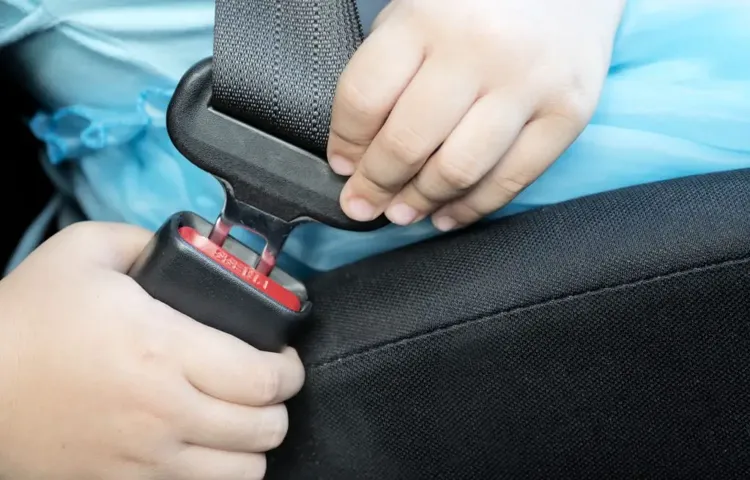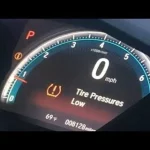Do you know what happens when you get a seat belt ticket? Besides facing fines or court appearances, your insurance rates could also go up. In this blog, we’ll explore the relationship between seat belt tickets and insurance, and what you need to know before getting behind the wheel. Whether you’re a frequent driver or someone who occasionally hits the road, understanding the impact of seat belt violations can help you make smarter decisions and stay safe on the road.
So buckle up and join us as we explore this important topic.
Table of Contents
Introduction
If you are wondering whether a seat belt ticket would affect your insurance rates, the answer varies from state to state and insurer to insurer. Some states consider seat belt violations as moving violations, which means they would appear on your driving record and could increase your insurance premiums. However, some states classify seat belt tickets as non-moving violations, which would not have an impact on your insurance rates.
Additionally, some insurers may not penalize you at all for a seat belt ticket, while others may increase your premiums. Ultimately, it is best to check with your state’s DMV and your insurance provider to determine how a seat belt ticket would affect your specific situation. Always remember to buckle up for your safety and to avoid costly tickets.
Explaining the Seat Belt Law and Ticket
The seat belt law is a regulation that requires drivers and passengers to wear seat belts while driving or riding in a moving vehicle. In most states, the law applies to all occupants of a vehicle, regardless of age or whether they are sitting in the front or back seat. Some states also require children under a certain age to be secured in a car seat or booster seat.
The reason for this law is to increase safety and prevent injury or death in the event of a car accident. Wearing a seat belt can reduce the risk of serious injury by up to 50%. If you are caught not wearing a seat belt, you can receive a ticket and a fine.
It’s important to buckle up every time you get in a car to ensure your safety and avoid getting in trouble with the law.

Explaining the Auto Insurance System
Auto Insurance System Auto insurance is a sort of contract between you and your insurance company, where you pay a premium to protect you against losses that may occur in the event of an accident, theft, or other damages to your vehicle. The insurance company will then pay for the damages according to the terms agreed upon in the policy. The amount you pay for your car insurance premium is determined by a multitude of factors like your age, driving record, type of vehicle, and driving habits.
Understanding how the auto insurance system works might be a bit challenging for some, especially when it comes to choosing the right coverage and making a claim. Still, it is necessary to know the ins and outs of car insurance to ensure you are fully covered and not taken advantage of. So, let’s dive deeper into the auto insurance system to better understand how it works.
Does a Seat Belt Ticket Affect Your Insurance?
If you’ve recently received a ticket for not wearing your seat belt, you may be wondering if it will affect your car insurance rates. The short answer is that it depends on your insurance company and the state in which you reside. In some states, seat belt violations are considered moving violations and can result in points on your driving record.
In turn, this can lead to higher insurance premiums. However, some states do not assign points for seat belt violations, so there may be no impact on your insurance rates. It’s important to check with your insurance provider to determine their policy on seat belt violations and if it will affect your rates.
In general, it’s always best to wear your seat belt while driving both for safety and to avoid getting a ticket. Stay safe on the road!
Factors That Affect Your Insurance Premiums
When it comes to car insurance premiums, there are a variety of factors that can influence how much you pay. One of these factors may include getting a seat belt ticket. The reason for this is that seat belts are an essential component of car safety and failure to wear one can increase the risk of serious injury or death during an accident.
Insurance companies take this risk into account when calculating premiums and may consider drivers who receive seat belt tickets to be higher-risk drivers. While the impact on premiums may vary depending on the insurance company and individual circumstances, it is important for drivers to always wear their seat belt both for safety and to potentially avoid any increases in their insurance rates. So buckle up, stay safe, and potentially save some money on your car insurance premiums.
Data on Insurance Increase After a Seat Belt Ticket
If you’ve ever received a seat belt ticket, you may be wondering if it will affect your insurance rates. Unfortunately, the answer is yes. According to data compiled by the National Highway Traffic Safety Administration, seat belt tickets can lead to an increase in insurance rates.
In fact, a single seat belt violation can raise rates by up to 5% or more, depending on the severity of the infraction. This is because insurance companies view seat belt violations as a sign of risky behavior, which can lead to more accidents and higher insurance claims. To avoid an increase in your insurance rates, it’s important to always buckle up and encourage your passengers to do the same.
It may seem like a minor inconvenience, but a seat belt ticket can ultimately cost you much more than the price of the fine.
What to Do If You Get a Seat Belt Ticket
Getting a seat belt ticket can be frustrating, but it’s important to know the consequences and how it may affect your insurance. While a seat belt ticket is considered a minor violation, it can still impact your insurance rates. Insurance companies typically look at your driving record over the past three to five years, and any ticket you receive within that time frame can lead to an increase in your premiums.
However, not all insurance companies consider seat belt tickets in their rating system, so it’s important to check with your specific provider. If you do receive a seat belt ticket, it’s always a good idea to contest it or take a defensive driving course to avoid having it show up on your driving record. Remember, wearing a seat belt not only keeps you safe on the road, but it can also save you money in the long run.
The Importance of Paying Your Ticket on Time
Seat belt tickets are a common issue that drivers face on the road. While it may seem like a minor infraction, it is essential to take these tickets seriously and pay them on time. If you receive a seat belt ticket, the penalties and fines can quickly add up if left unpaid.
Late fees and interest can accrue, leading to a larger bill than initially anticipated. It is always best to pay your ticket as soon as possible to avoid these additional charges and prevent further legal action against you. It’s essential to remember that paying your ticket promptly not only saves you money but also helps keep our roads safer by encouraging drivers to wear their seat belts and follow traffic laws.
So the next time you receive a seat belt ticket, make sure to take it seriously and take the necessary steps to rectify the situation promptly.
Ways to Dispute a Seat Belt Ticket
Getting a seat belt ticket can be frustrating, but there are ways to dispute it. One option is to argue that you were wearing your seat belt at the time of the incident. This can be difficult to prove, but if you have witnesses or evidence such as a photograph or video, it can help your case.
Another strategy is to challenge the officer’s judgement that you were not wearing a seat belt. You can ask for a second opinion or present evidence that the officer was mistaken. Additionally, you may be able to challenge the legality of the stop altogether if the officer had no probable cause to pull you over in the first place.
Whatever your approach, it’s important to gather as much evidence as possible to support your argument. By doing so, you may be able to get the ticket dismissed and avoid any fines or points on your license.
Conclusion
In conclusion, getting a seat belt ticket may not directly affect your insurance rates, but it could indirectly impact your overall driving profile. After all, insurance companies are in the business of assessing risks, and if you’re getting pulled over and ticketed for something as simple as not wearing a seat belt, it could suggest to the insurer that you’re not the most responsible or cautious driver out there. So buckle up, stay safe, and for the sake of your driving record and insurance rates, always remember to click it or ticket it!”
FAQs
What happens if I get a seat belt ticket?
Getting a seat belt ticket means you have violated the law by not wearing a seat belt while driving. You will likely be fined and your insurance rates may go up.
Does a seat belt ticket affect my driving record?
Yes, a seat belt ticket goes on your driving record and can negatively affect your driving history.
Will my insurance rate increase if I receive a seat belt ticket?
Yes, your insurance rates may go up because receiving a ticket is seen as a sign of risky behavior, which makes you a higher liability to insurance companies.
Can I contest a seat belt ticket if I was wearing my seat belt but was not able to produce proof at the time of the ticket?
Yes, you can contest a seat belt ticket. You will need to provide evidence that you were wearing your seat belt, such as a witness statement or pictures.
How can I avoid getting a seat belt ticket?
Always wear your seat belt while driving, even for short distances, and make sure your passengers do the same. It is the easiest way to avoid getting a ticket and to stay safe while driving.
Can I take a defensive driving course to cancel out a seat belt ticket?
It depends on the laws of your state. Some states may allow you to take a defensive driving course to cancel out the ticket, while others may not. Check with your local DMV for specific rules and regulations.
How long does a seat belt ticket stay on my driving record?
This varies by state. Typically, a seat belt ticket will stay on your driving record for three to five years, during which it can affect your insurance rates.



